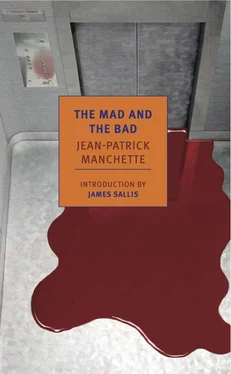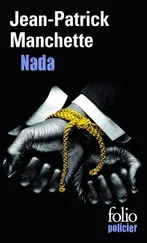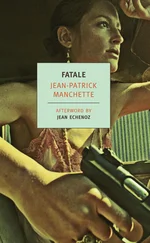Jean-Patrick Manchette - The Mad and the Bad
Здесь есть возможность читать онлайн «Jean-Patrick Manchette - The Mad and the Bad» весь текст электронной книги совершенно бесплатно (целиком полную версию без сокращений). В некоторых случаях можно слушать аудио, скачать через торрент в формате fb2 и присутствует краткое содержание. Год выпуска: 2014, ISBN: 2014, Издательство: New York Review Books, Жанр: Криминальный детектив, на английском языке. Описание произведения, (предисловие) а так же отзывы посетителей доступны на портале библиотеки ЛибКат.
- Название:The Mad and the Bad
- Автор:
- Издательство:New York Review Books
- Жанр:
- Год:2014
- ISBN:9781590177402
- Рейтинг книги:4 / 5. Голосов: 1
-
Избранное:Добавить в избранное
- Отзывы:
-
Ваша оценка:
- 80
- 1
- 2
- 3
- 4
- 5
The Mad and the Bad: краткое содержание, описание и аннотация
Предлагаем к чтению аннотацию, описание, краткое содержание или предисловие (зависит от того, что написал сам автор книги «The Mad and the Bad»). Если вы не нашли необходимую информацию о книге — напишите в комментариях, мы постараемся отыскать её.
The Mad and the Bad — читать онлайн бесплатно полную книгу (весь текст) целиком
Ниже представлен текст книги, разбитый по страницам. Система сохранения места последней прочитанной страницы, позволяет с удобством читать онлайн бесплатно книгу «The Mad and the Bad», без необходимости каждый раз заново искать на чём Вы остановились. Поставьте закладку, и сможете в любой момент перейти на страницу, на которой закончили чтение.
Интервал:
Закладка:
“The trouble with all this is that it wasn’t me. Not you, either, according to Peter. But I couldn’t make head or tail of his story. You know how kids are. He told me no end of crazy stuff. Gangsters, buildings on fire. . You tell me your version. Maybe I’ll believe you.”
Julie told him. A large sun shone in through the doorway. Dust danced in its beams. Fuentès dragged on his cigarette, the paper of which was burning unevenly. As Julie told her story, the man seemed to nod off.
“Your tale,” the man said at last, “has absolutely everything. Even the calvary-the ascent to the castle-as the finale. You must have had a shock when you saw me.”
Julie nodded. In her mind she felt disarmed.
“This, where we are,” he said, “is my place. It never belonged to Hartog, and he didn’t build it.”
“He told me just the opposite.”
“Yes. The rat. The dirty rat.”
“Be quiet!” cried Julie.
Fuentès pursed his lips. He seemed very tired.
“Now it’s my turn to tell a story,” he said. “Once upon a time there were two young men. . Listen, once there were two young men. .”
32
Once upon a time there were two young men. Hartog. Fuentès. Architects, working together. Penniless, more or less. They got along with each other pretty well. It was Fuentès who had most of the ideas, if I do say so myself. Hartog merely followed suit. Seemingly in agreement. It was thanks to him that the partnership stayed afloat. His family, who were rich, would commission projects that were rarely realized but brought in fat fees.
All of a sudden Hans-Peter and Marguerite Hartog were killed in an airplane crash. Young Hartog became rich. His architectural projects could be realized. And it became apparent that they did not really agree, Fuentès and he. Fuentès did not want to build factories, or workers’ housing. In fact it wasn’t obvious what Fuentès wanted. What is more, he was finding it harder and harder to work at all.
Hartog split up with him. Hartog busied himself with Hartog’s money. On the side, he built. A museum, factories of his design. Fuentès was furious. Should I carry on? The whole story had already been made into a novel, and a film by King Vidor with Gary Cooper, inspired by the life of Frank Lloyd Wright.
Fuentès gave up practicing as an architect. Just like Gary Cooper, he took odd construction jobs as a laborer, a stone breaker, occasionally a foreman. Then he bought some sheepfolds in the Massif Central and started building on them in his leisure time, whenever he wasn’t drunk (for it must be said that by now he was a serious lush). What he built was this idiotic kind of labyrinth.
Now and then, when he tied one on in Paris, he would pay Hartog a little visit. He would insult him. Accuse him of stealing his ideas. Occasionally knock him around a bit.
Julie was listening open-mouthed. Fuentès got up, went out, and came back almost right away with a bottle of beer. He drank straight from the bottle and did not sit down again. He strode up and down the room, punctuating his narrative with grand gestures and scathing laughter.
The funniest thing about it is that Hartog is jealous of Fuentès. I am quite sure of it. He is jealous-it’s as plain as day. He has taken pictures of this stupid labyrinth. Put them in his files. And the day you told him that the place was beautiful he pretended that it was his own private hermitage. The moron! The imbecile!
Fuentès burst out laughing, then began to cough. One got the impression that he would not be able to stop.
33
Julie was wearing her bloodstained shorts and the man’s shirt, whose sleeves she had rolled up. She was beginning to be able to walk again, leaning on Fuentès’s arm. It was now nine days since she had left the burning store. She was inspecting the room with the outsize furniture where she had passed out on the night of her arrival.
“A fantasy,” said Fuentès. “We tend to forget what it’s like to be a kid. In here you feel as if you were only a meter twenty tall all over again. You must have had a terrible shock.”
“Well, by that point. .”
Julie perched herself on a gigantic chair. She giggled like a little girl. Fuentès, beer bottle in hand, watched her sardonically. Through the window, narrow as a castle loophole, the girl could see Peter some fifty meters from the labyrinth. The boy was shooting arrows from a crude bow that Fuentès had made for him. Julie could not get used to the new figure Peter made. In a single week he had acquired a tan and slimmed down; his hair had grown thicker and his attitude had changed. He was running now among the flowers. It was like a commercial for some kind of return to nature.
“I’m already fit enough to leave here,” said Julie, who was no fan of nature.
She got down from the giant chair, went through the bead curtain, and picked her way through the debris beyond. The sun, still glorious, now shone full in her face. She heard Fuentès coming up behind her.
“You have no place to go,” the man told her.
“Straight to the police.”
“That’s a long walk.”
“You don’t have a car?”
Julie had turned round. Fuentès shook his head.
“I had an old Jeep. The right thing for hereabouts. But I drove it into a ravine one night when I was drunk. Now I’ll have to start saving up for another one. It pisses me off.”
He put his empty bottle down carefully beside the wall.
“Come and see my kiln,” he said.
They walked the perimeter of the labyrinth. Julie noticed a strictly horizontal stairway along a drystone wall and an inaccessible garden on top of a squat circular tower three meters high.
“You could stay here for weeks, even months,” remarked Fuentès as though the idea appealed to him.
“In my handbag is that photo,” Julie reminded him. “Sooner or later they’ll figure it out, and turn up here.”
“I have all I need to give them a warm welcome,” said Fuentès.
They were approaching his kiln. It was a stone-and-mortar excrescence on the outer wall of the labyrinth. Smoke issued from its base.
“What do you mean?” asked Julie.
“I have a gun.”
“You don’t know Thompson. He’s a frightening man. A gun won’t stop him.”
Fuentès laughed derisively. “A gun stops anybody.”
“You don’t get it. He’ll be at us before you know it, and he’ll kill us.”
“You’ve seen too many horror films,” said Fuentès.
He opened one of the kiln’s two doors, which were of thick rusted metal.
“I nicked these doors from a Nazi blockhouse in Normandy. Look, this is where I put the wood in.”
Fuentès piled logs onto the embers deep inside the opening. Julie touched the stone wall of the kiln. The stone was hot.
“My pots are above. I’m not opening up there, because they’re being fired. They’re all duds though. I mess up everything I do.”
He slammed the lower door.
“As for firewood,” he noted, “there’s no shortage. I simply have to go down the hill.”
Julie pictured him bare-chested, splitting logs. The picture was pleasant.
“I’ll go down tomorrow,” she said. “Down to the cops, I mean.”
“I’ll go with you,” said Fuentès. “You’ll be in a really tight spot trying to explain everything and getting them to believe you. Do you really think they’ll believe you? Anyway, you’ll need someone. I’ll find you a lawyer.”
“I’m not afraid of going to the cops anymore,” said the girl.
A hundred meters away, Peter was playing in the flowers and shouting for joy.
34
Hartog was spending more and more time in his chaise lounge on the Mediterranean coast. The redhead’s lips were badly swollen from continual biting. His fair eyelashes were blinking faster than usual. He let his gaze roam over the sea. In the distance sailboats slid sluggishly along-the wind was light. Nearer to the strand a small, potbellied rowboat was riding the swell.
Читать дальшеИнтервал:
Закладка:
Похожие книги на «The Mad and the Bad»
Представляем Вашему вниманию похожие книги на «The Mad and the Bad» списком для выбора. Мы отобрали схожую по названию и смыслу литературу в надежде предоставить читателям больше вариантов отыскать новые, интересные, ещё непрочитанные произведения.
Обсуждение, отзывы о книге «The Mad and the Bad» и просто собственные мнения читателей. Оставьте ваши комментарии, напишите, что Вы думаете о произведении, его смысле или главных героях. Укажите что конкретно понравилось, а что нет, и почему Вы так считаете.












